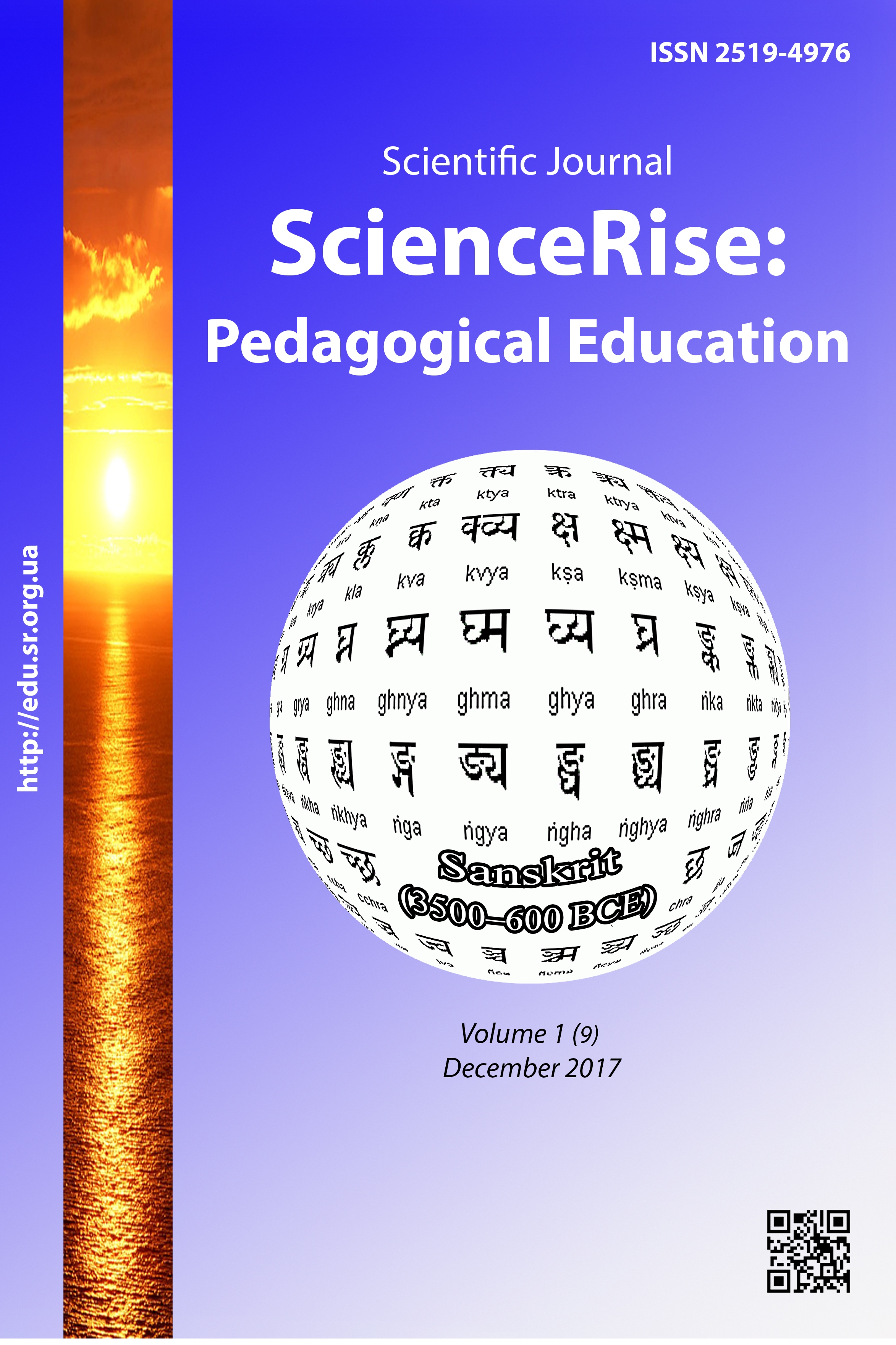Special course of study “fundamentals of conflictological culture” and its role in the formation of conflictological culture of future experts of socionomic professions.
DOI:
https://doi.org/10.15587/2519-4984.2017.91475Keywords:
special course, conflictological culture, experts of socionomic professions, vocational trainingAbstract
Special course of study “Fundamentals of conflictological culture of future experts of socionomic professions” is a deep problem development of the formation of conflictological culture of future experts of socionomic professions according to the program, proposed by the author. The special course built on the methodological principles: the unity of consciousness and activity, the theory and practice, the integration of knowledge from related fields of sciences - Psychology, Pedagogy, Social Psychology, and Conflict Resolution Studies. A determinant between efficiency of knowledge technology and quality of the process of the formation of conflictological culture is based on a complex organization of competence, system, active, cultural, self-oriented, axiological, acmeological, synergic approaches.
Actual problem of formation of conflictological culture of experts in modern conflictogenic environment, the role of the special course of study as the final stage of solving a definite problem, on which (stage) systematized and generalized theoretical knowledge and practical abilities and skills of the students in the article are proved. The concept of “conflictological culture of experts” as a multifaceted quality of activity of an expert is determined. The qualitative internal changes in the character, the direction, the opportunities of students in the process of the formation of conflictological culture and the psychological mechanisms of realization these changes are revealed. The goal, the task of the special course, the system of conflictological competences and competencies and the ways of formation of conflictological culture of future experts of socionomic professions are determined:
a) the presence of highly skilled creative teachers able to create on their classes atmosphere of cooperation, the priority values of knowledge and skills; motivate and encourage students to scientific research of activities, self-reflection and self-improvement.
b) the use of psychological-pedagogical system technologies as a way of realization of the special course content to achieve the goal of the formation of conflictological culture of future experts of socionomic professions
References
- Jiang, A. (2011). Special course "conflictological culture of future specialists in service" as a source of the conflict of culture Students. Modern information technologies and innovative teaching methods in training: methodology, theory, experience problems, 28, 290–295.
- Korostelin, M. O. (2014). Tech formation of future specialists Commodity and commercial activities for conflict prevention in professional activities. Scientific notes Berdyansk State Pedagogical University, 3, 134–143.
- Pidbuc'ka, N. V. (2008). Pedagogichni umovy formuvannja konfliktologichnoi' kul'tury majbutn'ogo inzhenera-mashynobudivnyka. Vinnycja, 254.
- Pochekaeva, I. S. (2010). Vospitanie konfliktologicheskoj kul'tury starsheklassnikov. Perm', 215.
- Samsonova, N. V. (2002). Konfliktologicheskaja kul'tura specialista i tehnologija ee formirovanija v sisteme vuzovskogo obrazovanija. Kaliningrad: Izd-vo KGU, 308.
- Serebrovskaja, N. E. (2011). Stanovlenie i razvitie konfliktologicheskoj kul'tury budushhego specialista socionomicheskoj professii v vuzovskij period. Nizhnij Novgorod, 53.
- Shherbakova, O. Y. (2011). Psyhologyja konflyktologycheskoj kul'turу lychnosty specyalysta: formyrovanye v kontekstnoj obrazovatel'noj srede. Moscow, 34.
- Shurіhyna, A.V. (2012). The development of student personality culture konflyktolohycheskoy. Nizhny Novgorod, 197.
- Heigl, P. (2010). 30 Minuten fuer faires Streiten und gute Konflikt-Kultur. 2003 GAB AL. 4 Auflage. Offenbach: Verlag GmbH, 80.
- Rosenberg, M. (2004). Konflikte lösen durch gewaltfreie Kommunikation. Freiburg im Breisgau: Verlag Herder GmbH, 160.
Downloads
Published
How to Cite
Issue
Section
License
Copyright (c) 2017 Тетяна Ромуальдівна Браніцька

This work is licensed under a Creative Commons Attribution 4.0 International License.
Our journal abides by the Creative Commons CC BY copyright rights and permissions for open access journals.
Authors, who are published in this journal, agree to the following conditions:
1. The authors reserve the right to authorship of the work and pass the first publication right of this work to the journal under the terms of a Creative Commons CC BY, which allows others to freely distribute the published research with the obligatory reference to the authors of the original work and the first publication of the work in this journal.
2. The authors have the right to conclude separate supplement agreements that relate to non-exclusive work distribution in the form in which it has been published by the journal (for example, to upload the work to the online storage of the journal or publish it as part of a monograph), provided that the reference to the first publication of the work in this journal is included.







